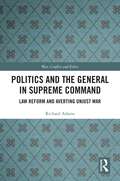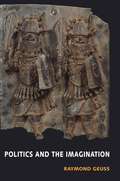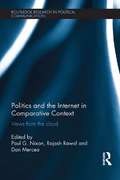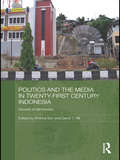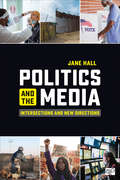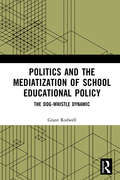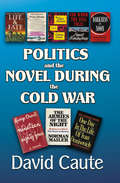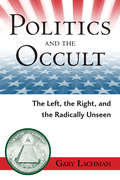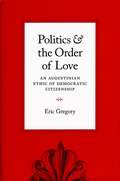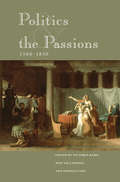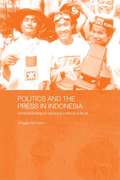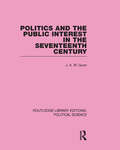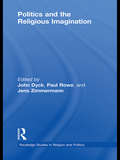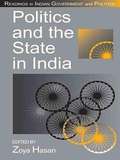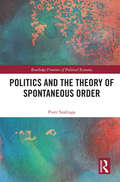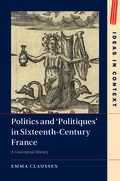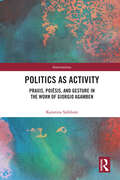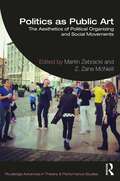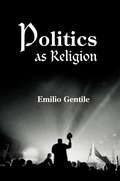- Table View
- List View
Politics and the General in Supreme Command: Law Reform and Averting Unjust War (War, Conflict and Ethics)
by Richard AdamsThis book argues for reform of the convention that, when politicians decide on a course of action, the general in supreme command obeys without question.The entire spread‑out chain of command is unified in the general, who offers the only connection between the military and politics. Offering the sole connection between the military and politics, only the general can turn political directions into military command and capacitate war. Thus, the general has unique opportunity to resist unconscionable direction to launch an unjust war or to conduct or expand war unjustly. This book argues for reform, so the general has the right in law to refuse direction which is lawful, but awful. The legal capacity to refuse would mean the general would be expected to act responsibly, not merely as the unresisting pawn of politics. Such reform, creating legal opportunity for the supreme command to refuse lawful but unconscionable directives, might avert unjust war.This book will be of much interest to students of the ethics of war, civil‑military relations, and international relations.
Politics and the Imagination
by Raymond GeussIn politics, utopians do not have a monopoly on imagination. Even the most conservative defenses of the status quo, Raymond Geuss argues, require imaginative acts of some kind. In this collection of recent essays, including his most overtly political writing yet, Geuss explores the role of imagination in politics, particularly how imaginative constructs interact with political reality. He uses decisions about the war in Iraq to explore the peculiar ways in which politicians can be deluded and citizens can misunderstand their leaders. He also examines critically what he sees as one of the most serious delusions of western political thinking--the idea that a human society is always best conceived as a closed system obeying fixed rules. And, in essays on Don Quixote, museums, Celan's poetry, Heidegger's brother Fritz, Richard Rorty, and bourgeois philosophy, Geuss reflects on how cultural artifacts can lead us to embrace or reject conventional assumptions about the world. While paying particular attention to the relative political roles played by rule-following, utilitarian calculations of interest, and aspirations to lead a collective life of a certain kind, Geuss discusses a wide range of related issues, including the distance critics need from their political systems, the extent to which history can enlighten politics, and the possibility of utopian thinking in a world in which action retains its urgency.
Politics and the Internet in Comparative Context: Views from the cloud (Routledge Research in Political Communication)
by Dan Mercea Paul G. Nixon Rajash RawalFor many years now we have witnessed the developing use of the internet and associated technologies by political actors and organisations. Claims and counter claims have been made as its suitability as a tool to help in the struggle to re-invigorate political participation in democracies across the globe has been contested. This book charts the shifting sands of political activity in the digital age. It interrogates the hybrid nature of modern politics as online and offline actions blur the boundaries of traditional politics between ‘real-life’ co-presence and the booming virtual domain of politics. By so doing, it critically reflects on the latest scholarship on the subject while concurrently advancing stimulating new insights into it. Encapsulating both the range and the diverse velocities of change in different political arenas and geographical locations, this volumes seeks to map out a path if not towards the politics of tomorrow then towards a better comprehension of the politics of today. Featuring a range of international and comparative case studies presenting research on the UK, US, Italy, France, Spain, Romania, Africa and China, this book will be of interest to students and scholars of Politics and Media, Political Communication, New Media studies, Public Administration, Sociology, Communication Studies, Computing and Information and Communications Technologies.
Politics and the Media in Twenty-First Century Indonesia: Decade of Democracy (Media, Culture and Social Change in Asia)
by Krishna SenEvery political aspirant and activist knows the media are important. But there is little agreement on how an increasingly diversified media operate in post-authoritarian transitions and how they might promote, or impede, the pathways to a sustainable liberal democracy in the 21st century. This book examines the role of the media during Indonesia’s longest experiment with democratisation. It addresses two important and related questions: how is the media being transformed, both in terms of its structure and content, by the changing political economy of Indonesia after the fall of Suharto? And what is the potential impact of this media in enabling or hampering the development of democracy in Indonesia? The book explores the relation between the working of democratisation, by examining the role of ethnic identity and nationalism; increasingly cheaper and diversified means of media production, challenging state monopolies of the media; the reality of personalised and globalised media; and the challenging of the connection between a free media and democracy by global capitalism and corporate control of the media. The book argues that the dominant forces transforming Indonesia today did not arise from the singular point of Suharto’s resignation, but from a set of factors which are independent from, but linked to, Indonesia’s internal politics and which shape its cultural industries.
Politics and the Media: Intersections and New Directions
by Jane Hall"The book is well versed in the scholarly literature as well as pop-culture references found in contemporary television shows and movies. But what stands out in the volume’s research is its utilization of interviews conducted by the author that provide a range of perspectives on the media and politics from the vantage points of U.S. senators, journalists, critics, and activists." —Kirkus Reviews "Jane Hall has written a brilliant analysis that is educational, entertaining and important. Her comprehensive and timely book will be required reading for scholars, and will be invaluable for general readers and anyone interested in the relationship between politics and the media." - Kenneth T. Walsh, veteran White House correspondent, adjunct professorial lecturer in communication, and author of 10 books on the presidency including Presidential Leadership in Crisis. "Finally, as current a book as possible incorporating scholarly work on the media and politics and up-to-date examples and suggested exercises that are sure to rivet student interest. From its coverage of a tweeting President constantly assailing the media to trenchant analyses of coverage of the BLM movement, immigration and how the media treats women candidates this book is a must- adopt for Media and Politics classes. It is also an excellent add on for classes on American Politics and Campaigns and Elections." - Karen O’Connor, Jonathan N. Helfat Distinguished Professor of Politics, Founder Women and Politics Institute, American University. "The book is very timely and it has good case studies for students to discuss in class. It has chapters on race- and gender-related issues. You can use it as the main textbook, or you can assign it as supplementary reading material." —Ivy Shen, PhD. Southeast Missouri State University Politics and the Media: Intersections and New Directions examines how media and political institutions interact to shape public thinking and debates around social problems, cultural norms, and policies. From the roles of race and gender in American politics to the 2020 elections and the global coronavirus pandemic, this is an extraordinary moment for politicians, the news media, and democracy itself. Drawing from years of experience as an active political media analyst, an award-winning journalist and professor of politics and the media, Jane Hall explores how media technologies, practices, and formats shape political decision-making; how political forces influence media institutions; and how public opinion and media audiences are formed. Students will gain an understanding of these issues through a combination of scholarship, in-depth interviews, and contemporary case-studies that will help them develop their own views and learn to express them constructively.
Politics and the Media: Intersections and New Directions
by Jane Hall"The book is well versed in the scholarly literature as well as pop-culture references found in contemporary television shows and movies. But what stands out in the volume’s research is its utilization of interviews conducted by the author that provide a range of perspectives on the media and politics from the vantage points of U.S. senators, journalists, critics, and activists." —Kirkus Reviews "Jane Hall has written a brilliant analysis that is educational, entertaining and important. Her comprehensive and timely book will be required reading for scholars, and will be invaluable for general readers and anyone interested in the relationship between politics and the media." - Kenneth T. Walsh, veteran White House correspondent, adjunct professorial lecturer in communication, and author of 10 books on the presidency including Presidential Leadership in Crisis. "Finally, as current a book as possible incorporating scholarly work on the media and politics and up-to-date examples and suggested exercises that are sure to rivet student interest. From its coverage of a tweeting President constantly assailing the media to trenchant analyses of coverage of the BLM movement, immigration and how the media treats women candidates this book is a must- adopt for Media and Politics classes. It is also an excellent add on for classes on American Politics and Campaigns and Elections." - Karen O’Connor, Jonathan N. Helfat Distinguished Professor of Politics, Founder Women and Politics Institute, American University. "The book is very timely and it has good case studies for students to discuss in class. It has chapters on race- and gender-related issues. You can use it as the main textbook, or you can assign it as supplementary reading material." —Ivy Shen, PhD. Southeast Missouri State University Politics and the Media: Intersections and New Directions examines how media and political institutions interact to shape public thinking and debates around social problems, cultural norms, and policies. From the roles of race and gender in American politics to the 2020 elections and the global coronavirus pandemic, this is an extraordinary moment for politicians, the news media, and democracy itself. Drawing from years of experience as an active political media analyst, an award-winning journalist and professor of politics and the media, Jane Hall explores how media technologies, practices, and formats shape political decision-making; how political forces influence media institutions; and how public opinion and media audiences are formed. Students will gain an understanding of these issues through a combination of scholarship, in-depth interviews, and contemporary case-studies that will help them develop their own views and learn to express them constructively.
Politics and the Mediatization of School Educational Policy: The Dog-Whistle Dynamic
by Grant RodwellDespite increasing prevalence over the past three decades and a clear impact on school education policy and practice, education’s connection to dog-whistle journalism and politics has not yet been fully explored. Addressing this gap, Politics and the Mediatization of School Educational Policy examines the emergence and current impact of dog-whistle politics and journalism on education in Australia, the US and the UK, questioning what is at stake when this political dog whistle is directed at school educational policy and practice. Exploring common targets for dog-whistling, such as teaching standards, teacher quality and specific curriculum areas, such as history, sex and health education, the book considers the broader social issues of xenophobia and racism, as well as the decline of print media and rise of digital news sources in its place, with each chapter including an in-depth discussion using peer-reviewed literature on the subject. Following the trail of dog whistles impacting in school educational policy and practice across these three countries, this book explores: To what extent is the dog-whistle dynamic embedded in school educational policy and practice? To what extent does the dog-whistle dynamic affect our understanding of school educational policy and practice? How might we explain the continued flurry of dog whistles impacting school educational policy and practice? As the phenomenon of the dog whistle intensifies both nationally and internationally, this timely and thought-provoking book is necessary reading for academics, postgraduate researchers and all members of school communities.
Politics and the Novel During the Cold War
by David CauteDavid Cautes wide-ranging study examines how outstanding novelists of the Cold War era conveyed the major issues of contemporary politics and history. In the United States and Western Europe the political novel flourished in the 1930s and 1940s, the crisis years of economic depression, fascism, the Spanish Civil War,the consolidation of Stalinism, and the Second World War. Starting with the high hopes generated by the Spanish Civil War, Caute then explores the god that failed pessimism that overtook the Western political novel in the 1940s. The writers under scrutiny include Hemingway, Dos Passos, Orwell, Koestler, Malraux, Serge, Greene, de Beauvoir, and Sartre. Strikingly different approaches to the burning issues of the time are found among orthodox Soviet novelists such as Sholokhov, Fadeyev, Kochetov, and Pavlenko. Soviet official culture continued to choke on modernism, formalism, satire, and allegory. In Russia and Eastern Europe dissident novelists offered contesting voices as they engaged in the fraught re-telling of life under Stalinism. The emergence of the New Left in the 1960s generated a new wave of fiction challenging Americas global stance. Mailer, Doctorow, and Coover brought fresh literary sensibilities tobear on such iconic events as the 1967 siege of the Pentagon and the execution of the Rosenbergs.
Politics and the Occult: The Left, the Right, and the Radically Unseen
by Gary LachmanThe gritty business of politics is not something we usually associate with the occult. But esoteric beliefs have influenced the destiny of nations since the time of ancient Egypt and China, when decisions of state were based on portents and astrology, to today, when presidents and prime ministers privately consult self-proclaimed seers. Politics and the Occult offers a lively history of this enduring phenomenon. Author and cultural pundit Gary Lachman provocativly questions whether the separation of church and state so dear to modern political philosophy should be maintained. A few of his fascinating topics include the fate of the Knights Templar and the medieval Gnostic Cathars, the occult roots of America and the French Revolution in Freemasonry, Gurdjieff and the swastika, Soviet interest in UFOs, the CIA and LSD, the Age of Aquarius, the millenarian politics that inform the struggle with Islamic terrorism, fundamentalism, and more.
Politics and the Order of Love: An Augustinian Ethic of Democratic Citizenship
by Eric GregoryAugustine -- for all of his influence on Western culture and politics -- was hardly a liberal. Drawing from theology, feminist theory, and political philosophy, Eric Gregory offers here a liberal ethics of citizenship, one less susceptible to anti-liberal critics because it is informed by the Augustinian tradition. The result is a book that expands Augustinian imaginations for liberalism and liberal imaginations for Augustinianism. Gregory examines a broad range of Augustine's texts and their reception in different disciplines and identifies two classical themes which have analogues in secular political theory: love -- and related notions of care, solidarity, and sympathy -- and sin -- as well as related notions of cruelty, evil, and narrow self-interest. In providing a constructive argument for Christian participation in liberal democratic societies, Gregory advances efforts to revive a political theology in which love's relation to justice is prominent. "Politics and the Order of Love" will provoke new conversations for those interested in Christian ethics, moral psychology, and the role of religion in a liberal society.
Politics and the Passions, 1500-1850
by Victoria Kahn ; Neil Saccamano & Daniela ColiFocusing on the new theories of human motivation that emerged during the transition from feudalism to the modern period, this is the first book of new essays on the relationship between politics and the passions from Machiavelli to Bentham. Contributors address the crisis of moral and philosophical discourse in the early modern period; the necessity of inventing a new way of describing the relation between reflection and action, and private and public selves; the disciplinary regulation of the body; and the ideological constitution of identity. The collection as a whole asks whether a discourse of the passions might provide a critical perspective on the politics of subjectivity. Whatever their specific approach to the question of ideology, all the essays reconsider the legacy of the passions in modern political theory and the importance of the history of politics and the passions for modern political debates. Contributors, in addition to the editors, are Nancy Armstrong, Judith Butler, Riccardo Caporali, Howard Caygill, Patrick Coleman, Frances Ferguson, John Guillory, Timothy Hampton, John P. McCormick, and Leonard Tennenhouse.
Politics and the Press in Indonesia: Understanding an Evolving Political Culture
by Angela RomanoThis book explores the evolving political culture in Indonesia, by discussing the country's dominant political philosophies, then showing how those philosophies affect the working lives of ordinary Indonesian citizens. It focuses in particular on the working lives of news journalists, a group that occupies a strategic social and political position.
Politics and the Public Interest in the Seventeenth Century (Routledge Library Editions)
by J. A. GunnThis book examines the concept of public interest against the background of English politics from the Civil War to the coming of the Hanoverians. These years witnessed both the rise of the modern notion of the public interest as a part of ordinary political language and the growth of a social philosophy of individualism. The new ideas challenged the status quo, based on order, reason of state and national power, in the name of legitimate self-interest and respect for the rights of the private person. In presenting a complex set of ideas in their historical context, the author examines both abstract philosophies and the issues of the day as recorded in press, pulpit and law courts. A chapter devoted to economic thought includes a re-assessment of the social assumptions of mercantilism.
Politics and the Religious Imagination (Routledge Studies in Religion and Politics)
by John DyckPolitics and the Religious Imagination is the product of a group of interdisciplinary scholars each analyzing the connections between religious narratives and the construction of regional and global politics, combining a set of theoretical and philosophic insights with several case studies that represent varied geographies and religious customs. The past decade has seen increasing interest in the links between religion and politics, and this edited volume seeks to take religion seriously as a motivator of action. Few studies have attempted to bring together the multi-disciplinary work in this burgeoning field of study and this work takes a global perspective, using a variety of contexts including East-West relations to analyze the following key themes: the constructive and destructive hermeneutics of religious stories the relevance and importance of religion as a dominant political narrative the rise of new stories among groups as agents of change the way that religious narratives help to define and constrain the Other the manipulation of religious stories for political benefit This work argues that it is insufficient to judge the relationship of religion and politics through mere institutional or quantitative lenses, and this collection proves that while this promise of the narrative part of the social imaginary has been recognized in political theory to a certain extent, its influence in the realm of empirical political science has yet to be fully considered. Combining the work of a wide range of experts, this collection will be of great interests to scholars of politics, philosophy, religious studies, and the literary influence of religion.
Politics and the Sacred
by Harald WydraThis path-breaking book argues that practices of the sacred are constitutive of modern secular politics. Following a tradition of enquiry in anthropology and political theory, it examines how limit situations shape the political imagination and collective identity. As an experiential and cultural fact, the sacred emerges within, and simultaneously transcends, transgressive dynamics such as revolutions, wars or globalisation. Rather than conceive the sacred as a religious doctrine or a metaphysical belief, Wydra examines its adaptive functions as origins, truths and order which are historically contingent across time and transformative of political aspirations. He suggests that the brokenness of political reality is a permanent condition of humanity, which will continue to produce quests for the sacred, and transcendental political frames. Working in the spirit of the genealogical mode of enquiry, this book examines the secular sources of political theologies, the democratic sacred, the communist imagination, European political identity, the sources of human rights and the relationship of victimhood to new wars.
Politics and the Search for the Common Good
by Hans SlugaRethinking politics in a new vocabulary, Hans Sluga challenges the firmly held assumption that there exists a single common good which politics is meant to realize. He argues that politics is not a natural but a historical phenomenon, and not a single thing but a multiplicity of political forms and values only loosely related. He contrasts two traditions in political philosophy: a 'normative theorizing' that extends from Plato to John Rawls and a newer 'diagnostic practice' that emerged with Marx and Nietzsche and has found its three most prominent twentieth-century practitioners in Carl Schmitt, Hannah Arendt, and Michel Foucault. He then examines the sources of diagnostic political thinking, analyzes its achievements, and offers a critical assessment of its limitations. His important book will be of interest to a wide range of upper-level students and scholars in political philosophy, political theory, and the history of ideas.
Politics and the State in India
by Zoya HasanExamining the processes of state formation and consolidation, and the erosion of the post-colonial state, this book highlights three themes: the constraints of modernization; the contradictory logic of modernization vis-a-vis assertive political identities; and the politics of the governed and the battle for equal status at the level of the state. It sees the present crisis of the Indian state as a direct result of the post-colonial state's inability to grapple with the social and multicultural realities of the Indian polity, thus making way for various religious, caste and regional frictions to surface.
Politics and the Street in Democratic Athens
by Alex GottesmanThis book is the first in-depth study of the classical Athenian public sphere. It examines how public opinion was created by impromptu theatrics and by gossip, and how it flowed into and out of the civic institutions. Athenians did not have hookah bars or coffee shops but they did socialize in symposia and gymnasia and workshops, and above all in the Agora. These represented the Athenian 'street', an informal political space that was seen as qualitatively different from the institutional space of the assembly, the council and the courts where elite orators held sway. The book explores how Athenians of all sorts, such as politicians, slaves and philosophers, sought to exploit the resources of the 'street' in pursuit of their aims.
Politics and the Theory of Spontaneous Order (Routledge Frontiers of Political Economy)
by Piotr SzafrugaThe theory of spontaneous order conceptualises and explains a number of institutional and social phenomena that are not an intended effect of either individual decisions or a collective consensus but an unplanned outcome of interactions between people pursuing their own aims. Drawing on these insights, this book demonstrates the utility of the theory of spontaneous order in explaining many phenomena in political economy and political science. The book opens with a discussion of the history and development of the theory of spontaneous order, particularly in economics and the Austrian School. The epistemological premises of the theory are then explored including the formulation of the central idea of social individualism. Demonstrating the potential applications of the theory of spontaneous order to politics, core ideas are examined including democracy, fragile states and the concept of the veil of ignorance. Finally, the limitations and constraints of the theory of spontaneous order are also reviewed and discussed. This book marks a valuable contribution to the literature on political economy, political science, public choice and political philosophy.
Politics and ‘Politiques' in Sixteenth-Century France: A Conceptual History (Ideas in Context #134)
by Emma ClaussenDuring the French Wars of Religion, the nature and identity of politics was the subject of passionate debate and controversy. The word 'politique', in both sixteenth-century and contemporary French, refers to the theory and practice of politics - 'la politique' - and the statesman or politician - 'le politique' - who theorised and practised this art. The term became invested with significance and danger in early modern France. Its mobilisation in dialogues, treatises, debates, and polemics of the French Wars of Religion was a crucial feature of sixteenth-century experiences of the political. Emma Claussen investigates questions of language and power over the course of a tumultuous century, when politics, emerging as a discipline in its own right, seemed to offer a solution to civil discord but could be fatally dangerous in the wrong hands. By placing this important term in the context of early modern political, doctrinal and intellectual debates, Emma Claussen demonstrates how politics can be understood in relation to the wider linguistic and conceptual struggles of the age, and in turn influenced them.
Politics as Activity: Praxis, Poiēsis, and Gesture in the Work of Giorgio Agamben (Interventions)
by Katarina SjöblomEngaging with a fundamental question at the heart of the Western tradition of political thought, namely the question of political action, this book considers a broad range of issues, from resistance to political mobilization. It explores the nature of political activity by engaging with Giorgio Agamben and his key interlocutors such as Hannah Arendt and Alexandre Kojève. It offers new insights into the complexity of Agamben’s political thought and intervenes in contemporary debates on issues such as identity politics and protest movements.A fresh contribution to Agamben scholarship and a rigorous reflection on one of the core political questions of the occidental tradition, this volume will be of interest to scholars and students from a broad range of subject areas, including political theory, political philosophy, political science, aesthetics, philosophy of language, and biopolitics.
Politics as Development: The Emergence of Political Parties in Nineteenth-Century Serbia
by Gale StokesNineteenth-century Serbia was an economically and socially backward country with an urban population of approximately 3 percent and a literacy rate in the countryside of less than 10 percent. Still, during that century it created a functioning democracy with a constitution, independent courts, political parties, and civil liberties. The Serbian experience challenges the view that political structures fundamentally depend on socioeconomic ones, since Serbia created a modern political system without developing economically. Politics as Development analyzes one aspect of that process, the emergence of political parties in the 1870s and the 1880s, especially the creation of the Serbian Radical Party under the leadership of Nikola Pasic. By mobilizing the peasantry through organizing the countryside, the Radicals proved themselves the most original nineteenth-century Balkan political movement. Based on thorough research of primary documents, Stokes's study supports the view that the state and its attending class constitute an independent variable in the developmental process.
Politics as Public Art: The Aesthetics of Political Organizing and Social Movements (Routledge Advances in Theatre & Performance Studies)
by Martin Zebracki Z. Zane McNeillPolitics as Public Art presents a keystone collection that pursues new frameworks for a critical understanding of the relationship between public art and protest movements through the utilization of socially engaged and choreopolitical approaches. This anthology draws from a unique combination of interdisciplinary scholarship and activism where it integrates geographically rich perspectives from political and grassroots community contexts spanning the United States, Europe, Australia, and Southeastern Africa. The volume questions, and reimagines, not only how public art practice can be integral to politics, including forms of surveillance and control of bodily movement. It also probes into how political participation itself can be construed as a form of public artmaking for radical social change and just worlds. This collection advocates for scholar-activist inquiry into how socially engaged public art practices can pave the way for thinking through—and working toward—championing more inclusive futures and, as such, choreographing greater intersectional justice. This book provides a wide appeal to audiences across humanities and social science scholarship, arts practice, and activism seeking conceptual and empirically informed tools for moving from public art and choreopolitical theory into modes of praxis: critical reflection and action.
Politics as Radical Creation
by Christopher HolmanPolitics as Radical Creation examines the meaning of democratic practice through the critical social theory of the Frankfurt School. It provides an understanding of democratic politics as a potentially performative good-in-itself, undertaken not just to the extent that it seeks to achieve a certain extrinsic goal, but also in that it functions as a medium for the expression of creative human impulses. Christopher Holman develops this potential model through a critical examination of the political philosophies of Herbert Marcuse and Hannah Arendt.Holman argues that, while Arendt and Marcuse's respective theorizations each ultimately restrict the potential scope of creative human expression, their juxtaposition - which has not been previously explored - results in a more comprehensive theory of democratic existence, one that is uniquely able to affirm the creative capacities of the human being. Yielding important theoretical results that will interest scholars of each theorist and of theories of democracy more generally, Politics as Radical Creation provides a valuable means for rethinking the nature of contemporary democratic practice.
Politics as Religion
by Emilio GentileEmilio Gentile, an internationally renowned authority on fascism and totalitarianism, argues that politics over the past two centuries has often taken on the features of religion, claiming as its own the prerogative of defining the fundamental purpose and meaning of human life. Secular political entities such as the nation, the state, race, class, and the party became the focus of myths, rituals, and commandments and gradually became objects of faith, loyalty, and reverence. Gentile examines this "sacralization of politics," as he defines it, both historically and theoretically, seeking to identify the different ways in which political regimes as diverse as fascism, communism, and liberal democracy have ultimately depended, like religions, on faith, myths, rites, and symbols. Gentile maintains that the sacralization of politics as a modern phenomenon is distinct from the politicization of religion that has arisen from militant religious fundamentalism. Sacralized politics may be democratic, in the form of a civil religion, or it may be totalitarian, in the form of a political religion. Using this conceptual distinction, and moving from America to Europe, and from Africa to Asia, Gentile presents a unique comparative history of civil and political religions from the American and French Revolutions, through nationalism and socialism, democracy and totalitarianism, fascism and communism, up to the present day. It is also a fascinating book for understanding the sacralization of politics after 9/11.
